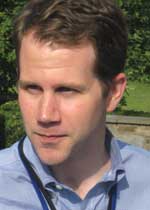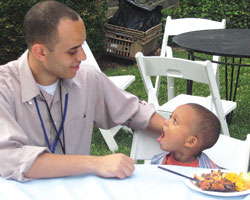New career trajectories: studying disease overseas
July - August, 2009 | Volume 8, Issue 4
Among the post-doctoral fellows selected for this year’s Fogarty international clinical research training program are two cardiology researchers whose interest in global health sprang in part from spiritual roots.

Dr. Mark Huffman will
conduct his fellowship
research in New Delhi on
cardiovascular disease
among Indians, who
are having heart attacks
in their 30s and 40s.
Hometown: St. Louis
Age: 32
Degrees: B.S., biology,
University of Notre Dame;
MPH, M.D., Tulane University
Residency: University of
Michigan Health System (chief)
Current: Cardiology fellow,
Northwestern University
Training site: All India
Institute of Medical Sciences,
New Delhi.
Neither Dr. Mark Huffman, who will be going to New Delhi, nor Dr. Gerald Bloomfield, who will be training in Kenya, knew each other before July's orientation on the NIH campus, but they have a common interest in figuring out the causes of cardiovascular disease in countries with emerging economies.
While they could progress comfortably in their fellowship programs (Huffman at Northwestern University and Bloomfield at Duke University) and become highly compensated cardiology subspecialists, their motivation exemplifies the mission of the Fogarty International Clinical Research Scholars and Fellows program, now in its sixth year.
Training in resource-poor countries also will pay off for resource-poor areas in the United States, Huffman predicts, observing that cardiac care in pockets of New Delhi may equal or surpass the quality of care in pockets of the United States.
His motivation is both academic and personal, says Huffman, who was inspired as a child by the missionary work of Dr. Tom Dooley in Southeast Asia, who also was from St. Louis and went to the University of Notre Dame.

Dr. Gerald Bloomfield, a cardiology fellow, will be
taking his family, including 3-year-old Josiah, to
Kenya for a year while he investigates the
epidemiology of heart failure.
Hometown: Brooklyn
Age: 34
Degrees: A.B. in psychology, Princeton University;
MPH, M.D., the Johns Hopkins University
Residency: the Johns Hopkins University (chief)
Current: Cardiology fellow, Duke University
Training site: Moi University School of Medicine,
Eldoret, Kenya
Huffman praises the Fogarty program for offering "a chance to propel my career beyond its previous trajectory" and to network with other trainees and with mentors, some of whom are giants in their fields.
Bloomfield, too, had an inspiration for his current work; visiting Kenya as part of a Christian mission in 2006, where "I saw more chronic cardiovascular disease than I should see."
In both India and Kenya, rising incomes and adoption of Western lifestyles are combining to lengthen life expectancy and, at the same time, increase stress, smoking and obesity—suddenly making chronic diseases just as important in the developing world as infectious diseases.
"The problem in Africa is we don't know a lot," says Bloomfield. "We don't know if (chronic illness) is along class lines. It was believed in the 1970s that Africans were immune to chronic heart disease. Look at the dietary habits now. Back then, women walked from town to town to get news. Now everyone has phones."
In India, says Huffman, the burden of cardiovascular disease becomes apparent at a younger age than in the United States.
He will be collecting data for a new Web-based registry in order to determine the extent of heart failure, with the expectation the information will lead to guideline-based therapy based on factors unique to India.
Using new portable diagnostic tools, Bloomfield likewise hopes to collect pilot data on the burden of atherosclerosis among heart failure patients in order to establish a database to guide future larger studies.
To view Adobe PDF files,
download current, free accessible plug-ins from Adobe's website.